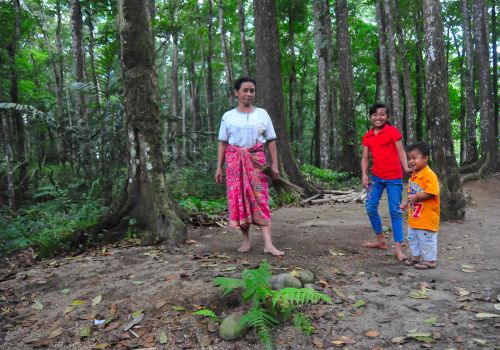By Amantha Perera
RIO DE JANEIRO, Jun 21 (TerraViva) He was on a flight to the biggest international summit on environment in a decade when Kenyan indigenous rights activist Peter Kitelo’s attention was suddenly drawn to a government advertisement.

Indigenous tribes like these on the remote Indonesian island of Lombok are increasingly threatened by development. Credit: Amantha Perera/IPS
It called for national and international investors to put funds into “forest development”. Kitelo could not escape the irony. Here he was, on route to the Rio+20 U.N. Conference on Sustainable Development, and he was looking at yet another assault on the livelihoods and very existence of indigenous communities.
“Sustainable development is not really sustaining my people,” Kitelo told TerraViva in Rio.
He said that forest communities like his and in other East African countries such as Uganda and Tanzania are discriminated against by central governments and policy-makers who determine the future of their native lands.
“We are being left out, no one talks to the right people in our communities,” he said.
When plans are laid for land development, they are advertised in newspapers and other media, to which native tribes hardly have access. Only when the plans are reaching their final stage will officials come and hold short meetings in villages, which Kitelo says are more an effort to satisfy donor requirements than a genuine effort at engagement.
“Then, even before we know it, our land is not ours anymore,” he said.
Kitelo cited the example of forest development for tourism. The concept talks about preserving the forests, but in the process prevents his people from using the forest. “The whole concept of forest conservation does not allow human interaction, but that is what my people have been doing for generations,” he said.
The Kenyan experience is hardly unique. All over the world, indigenous communities complain that they are being left out of the decision-making processes on their own land.
Laura George, from the Amerindian Peoples’ Association of Guyana, told TerraViva that when new land laws were to be introduced in June 2009, there were no consultations with the indigenous people at all. A year later, a final document was produced.
Government officials attending the Rio conference held a side event and claimed that indigenous populations were in fact consulted.
“When I informed them they weren’t, the officials were not happy, but that is the truth,” George told TerraViva.
This type of discrimination can lead to indigenous communities losing their way of life completely.
“While governments are coming to Rio to talk about sustainable development, in my country, Peru, the pressure is growing day by day from policies of the national government that seek to open up our remote forest territories to transnational companies through road infrastructure projects,” said Robert Guimaraes Vasquez of the Shipibo people in the Peruvian Amazon.
Activists said that even in Rio, indigenous groups faced discrimination, with logistics preventing them from gathering together.
“One group is here, another group is 40 km away. How can we form a common front? We are so far apart here,” George said.
Still, conferences like Rio+20 do offer at least small avenues where indigenous groups can bring their problems to a wider and influential audience.
George and Kitelo both told TerraViva that if governments remain deaf to their concerns, they will seek action within international bodies.
“That could be our last resort,” George said.







 Add to Google
Add to Google







